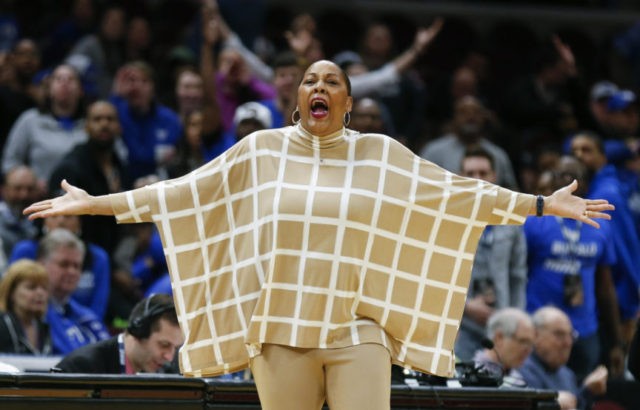COLUMBUS, Ohio (AP) — Buffalo coach Felisha Legette-Jack was thankful for the second chance.
Most black women’s basketball coaches don’t get that opportunity.
“I have some really amazing colleagues that look like me,” she said after her team lost to South Carolina in the Albany Region semifinals . “I have so many friends that had an opportunity and they lose their opportunities and never will be coming back up at all.”
The 51-year-old Legette-Jack led the Bulls to the Sweet 16 as an 11-seed. She got the top job at the school after she was let go by Indiana.
“It took an African-American woman to notice me when I lost my job at Indiana,” Legette-Jack said. “Had she not noticed me, Danny White would have never known about me; and because she spoke to him and I was able to present myself to him, I was able to get this opportunity to bring this — from where it was to where it is now.”
It often doesn’t get this far.
According to the most recent Diversity and Ethics in Sport report on college athletics by Richard Lapchick, only 11.4 percent of head coaches for women’s hoops were African-American women in 2016-17. That’s 37 of the 315 jobs.
Only of a few of those coaches got a second chance after they were let go from their first job.
“They are not getting very many opportunities and it’s not usual for an African-American woman to get a second chance let alone a first chance,” Lapchick said. “Too often what’s happened with African-American head coaches is if they aren’t successful in the first two or three years they get a shorter period to (succeed) in. It’s problematic for sure.”
Legette-Jack and Dawn Staley were two of only six black female head coaches in the NCAA Tournament this year. None are in the Final Four.
Staley became the second black coach to win a women’s national championship when she guided South Carolina to the title last year.
“I hope my success is a beacon of hope for other black coaches and also a beacon of hope to other ADs to see that given an opportunity, you can win a national championship,” she said.
While head coaching numbers have been consistent over the last decade, there are more African-American assistants than 10 years ago, rising from 14.2 percent in 2007-08 to 29.5 percent last year.
Jolette Law got a chance at Illinois after working as an assistant at Rutgers under C. Vivian Stringer. Law went 69-93 in her five years at Illinois before being fired. She has bounced around as an assistant since then, at Tennessee and now South Carolina.
She doesn’t know if she will get another chance as a head coach despite being one of the most well-respected assistants in the sport.
“You get calls but it’s not for the BCS jobs. They are looking elsewhere or for the next up-and-coming assistant coaches. Sometimes it is disheartening,” Law told The Associated Press. “You sit back and think I’m not the first person they are calling. They are looking at what you did as a previous head coach and not taking into account what you can do for a program.”
UConn coach Geno Auriemma was upset when his former assistant coach Jamelle Elliott was fired at Cincinnati last week after leading the school to its best record in 15 years. He feels part of the problem is athletic directors and school presidents are looking for “the flavor of the month” or “what’s going to make me look good in my athletic department,” as opposed to trying to find someone who can actually build a program over the long haul.
“A lot of kids like Jamelle and Felisha get jobs they aren’t prepared for. Why? Because it looks good,” Auriemma said. “They are put in situations where they can’t win. And then five years later they are fired (they) go ‘See, I told you.’ Well, they had no chance right from the beginning, so nobody wants to give them a second chance.”
Auriemma thinks it’s so important for a coach to find the right fit as opposed to just taking the first opportunity. The Hall of Famer noted that Staley was given a shot at Temple where there wasn’t as much pressure to succeed right away. That helped her develop the Owls into a consistent winner before she moved to South Carolina.
“It takes a while to get a program off the ground, especially a dormant program, and people want you to be great, you know, from the start,” Staley said. “It takes a very long time. It takes patience. It takes an AD that has patience.”
___
Follow Doug on Twitter at http://www.twitter.com/dougfeinberg

COMMENTS
Please let us know if you're having issues with commenting.